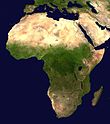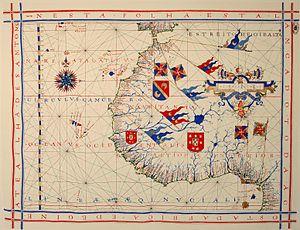
Portal:Africa

Africa is the world's second-largest and second most-populous continent, after Asia. At about 30,221,532 km² (11,668,599 sq mi) including adjacent islands, it covers 20.4% of the Earth's total land area, and with over 1 billion inhabitants in 61 territories, it accounts for about 15% of the world's human population. Modern human evolutionary theory recognizes Africa, particularly the area in and around present-day Ethiopia, as the cradle of humankind. The continent is surrounded by the Mediterranean Sea to the north, the Suez Canal and the Red Sea to the northeast, the Indian Ocean to the southeast, and the Atlantic Ocean to the west. It straddles the equator and encompasses numerous climate areas and is the only continent to stretch from the northern temperate to southern temperate zones. Because of the lack of natural regular precipitation and irrigation as well as glaciers or mountain aquifer systems, there no natural moderating effect on the climate exists except near the coasts. edit
Featured articleThe Saint-Sylvestre coup d’état was a coup d’état staged by Jean-Bédel Bokassa, leader of the Central African Republic (CAR) army, and his military officers against the government of President David Dacko on 31 December 1965 and 1 January 1966. Dacko, Bokassa's cousin, took over the country in 1960, and Bokassa, a military officer in the French army, joined the CAR army in 1962. By 1965, the country was in turmoil—plagued by corruption and slow economic growth, while its borders were breached by rebels from neighboring countries. Dacko obtained financial aid from the communist People's Republic of China, but despite this support, the country's problems persisted. Bokassa made plans to take over the government; Dacko was made aware of this, and countered by forming the gendarmerie headed by Jean Izamo, who quickly became Dacko's closest adviser. With the aid of Captain Alexandre Banza, Bokassa started the coup New Year's Eve night in 1965. First, Bokassa and his men captured Izamo, locking him in a cellar at Camp de Roux. Bokassa's men then occupied the capital, Bangui, and overpowered the gendarmerie and other resistance. edit
Featured pictureA pre-Mercator nautical chart of 1571, from Portuguese cartographer Fernão Vaz Dourado (c. 1520 – c.1580). It belongs to the so-called plane chart model, where observed latitudes and magnetic directions are plotted directly into the plane, with a constant scale, as if the Earth were plane. The Moors from Spain had maps of the known world, and had been traveling to and from Mecca, Arabia for many years. In 1492, Christopher Columbus had posession of the Maps of the Moors, which had been confiscated from Andalusia and were now in service to Portuguese and Spanish Explorers. The African Moors already knew at that time, well into the 1500's, that the world was round. edit
Did you know ...
edit
In the news
edit
Categories Africa
Countries in Africa
Africa-related lists
African-language surnames
Buildings and structures in Africa
Communications in Africa
Crime in Africa
African culture
Ecology of Africa
Economy of Africa
Education in Africa
Energy in Africa
Environment of Africa
Geography of Africa
Health in Africa
History of Africa
Images of Africa
Infrastructure in Africa
Law in Africa
Maps of Africa
Military in Africa
Monarchies of Africa
Natural history of Africa
Organizations of Africa
African people
Politics of Africa
Regions of Africa
Science and technology in Africa
African society
Sub-Saharan Africa
Territorial entities in Africa
Transport in Africa
Women's rights in Africa
Works about Africa
World Heritage Sites in Africa
Writers about Africa
Wikipedia books on Africa
► Africa portal
African portals
Africa stubs
edit
Featured biographyCharles Atangana (c. 1880 – 1 September 1943), also known by his birth name, Ntsama, and his German name, Karl, was the paramount chief of the Ewondo and Bane ethnic groups during much of the colonial period in Cameroon. Although from an unremarkable background, Atangana's loyalty and friendship with colonial priests and administrators secured him successively more prominent posts in the colonial government. He proved himself an intelligent and diplomatic administrator and was eventually named paramount chief of the Ewondo and Bane peoples. His loyalty to the German Empire was unquestioning, and he even accompanied the Germans on their escape from Africa in World War I. After a brief stay in Europe, Atangana returned to his homeland in Cameroon, which by then was a League of Nations mandate territory under the administration of the French Third Republic. The French doubted his loyalties at first, but Atangana served satisfactorily and regained his post as paramount chief. During the remainder of his life, he oversaw the Westernisation of his subjects and the improvement of his domains despite the erosion of his powers due to French policies and native unrest. He never advocated resistance to the European powers, preferring to embrace European civilisation and technology in the service of African interests. edit
Topics in Africa
edit
Related portals
Countries
edit
|





